Management Processes at Toyota: Kanban, JIT, and TQM Analysis
VerifiedAdded on 2022/08/21
|7
|1591
|11
Report
AI Summary
This report examines the management processes employed by Toyota Motor Company, focusing on the implementation of the Kanban system, Just-in-Time (JIT) management, and Total Quality Management (TQM). The analysis highlights how Toyota leverages these methods to optimize resource utilization, reduce waste, and enhance productivity. The report delves into specific elements of the Kanban system, such as shorter setup times and standardized operational procedures. It further explores the principles of JIT management, emphasizing inventory minimization and workflow maximization. Additionally, the report discusses TQM's role in ensuring customer satisfaction through a customer-centric approach and employee empowerment. The study concludes by emphasizing the positive contributions of these management processes to Toyota's overall productivity and competitiveness. The report draws on the provided case study, detailing how Toyota has successfully integrated these systems to achieve operational excellence.
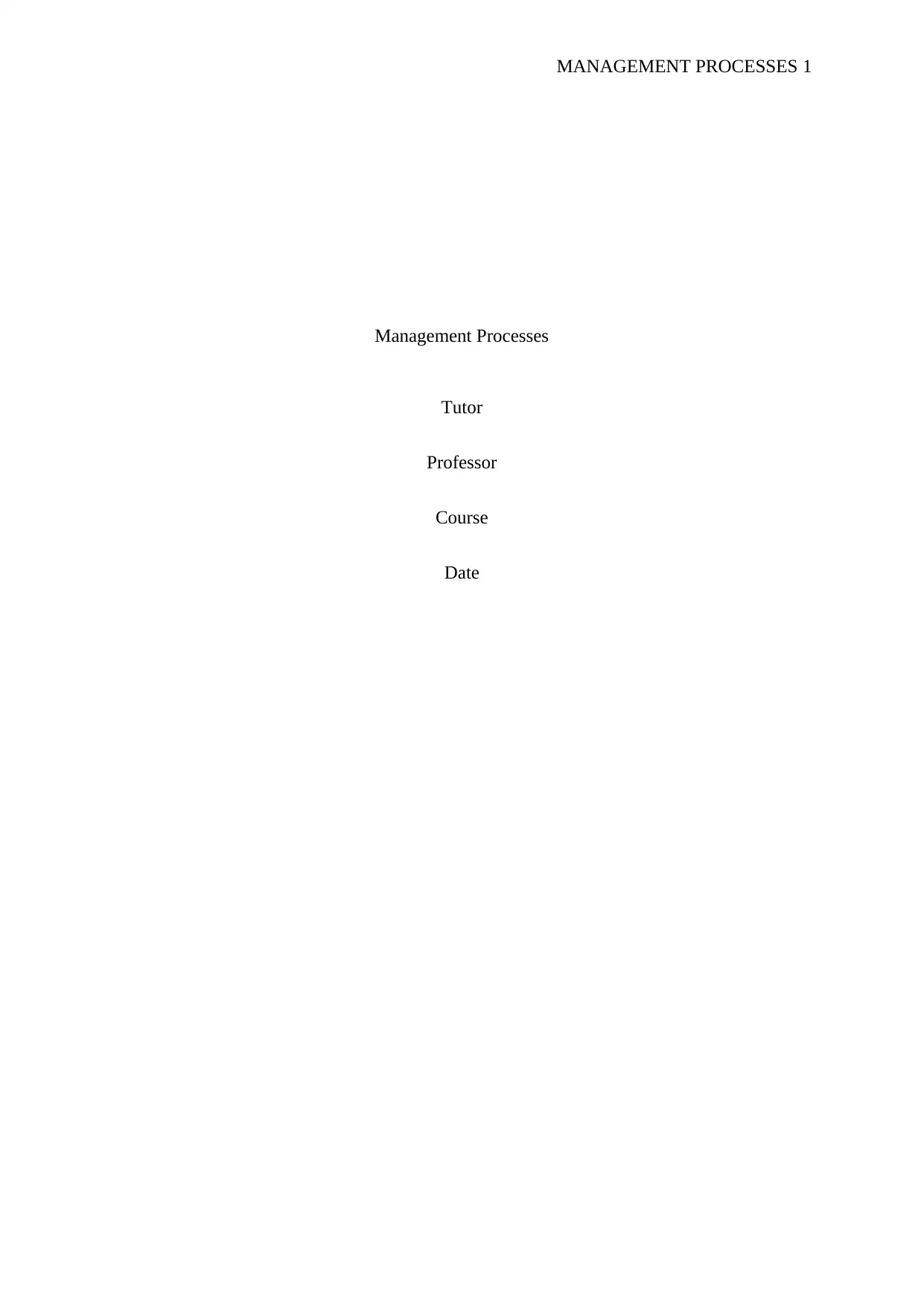
MANAGEMENT PROCESSES 1
Management Processes
Tutor
Professor
Course
Date
Management Processes
Tutor
Professor
Course
Date
Paraphrase This Document
Need a fresh take? Get an instant paraphrase of this document with our AI Paraphraser
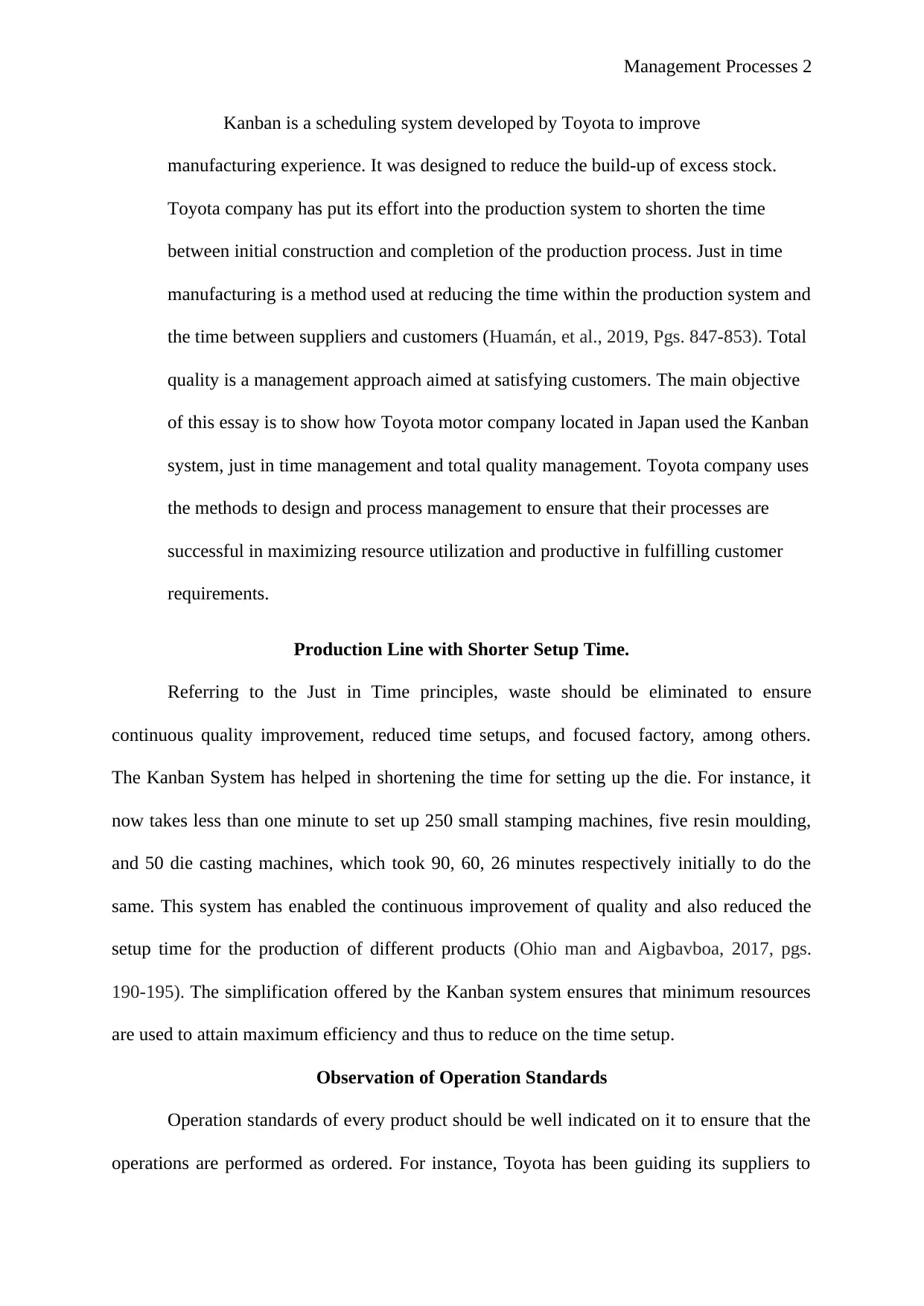
Management Processes 2
Kanban is a scheduling system developed by Toyota to improve
manufacturing experience. It was designed to reduce the build-up of excess stock.
Toyota company has put its effort into the production system to shorten the time
between initial construction and completion of the production process. Just in time
manufacturing is a method used at reducing the time within the production system and
the time between suppliers and customers (Huamán, et al., 2019, Pgs. 847-853). Total
quality is a management approach aimed at satisfying customers. The main objective
of this essay is to show how Toyota motor company located in Japan used the Kanban
system, just in time management and total quality management. Toyota company uses
the methods to design and process management to ensure that their processes are
successful in maximizing resource utilization and productive in fulfilling customer
requirements.
Production Line with Shorter Setup Time.
Referring to the Just in Time principles, waste should be eliminated to ensure
continuous quality improvement, reduced time setups, and focused factory, among others.
The Kanban System has helped in shortening the time for setting up the die. For instance, it
now takes less than one minute to set up 250 small stamping machines, five resin moulding,
and 50 die casting machines, which took 90, 60, 26 minutes respectively initially to do the
same. This system has enabled the continuous improvement of quality and also reduced the
setup time for the production of different products (Ohio man and Aigbavboa, 2017, pgs.
190-195). The simplification offered by the Kanban system ensures that minimum resources
are used to attain maximum efficiency and thus to reduce on the time setup.
Observation of Operation Standards
Operation standards of every product should be well indicated on it to ensure that the
operations are performed as ordered. For instance, Toyota has been guiding its suppliers to
Kanban is a scheduling system developed by Toyota to improve
manufacturing experience. It was designed to reduce the build-up of excess stock.
Toyota company has put its effort into the production system to shorten the time
between initial construction and completion of the production process. Just in time
manufacturing is a method used at reducing the time within the production system and
the time between suppliers and customers (Huamán, et al., 2019, Pgs. 847-853). Total
quality is a management approach aimed at satisfying customers. The main objective
of this essay is to show how Toyota motor company located in Japan used the Kanban
system, just in time management and total quality management. Toyota company uses
the methods to design and process management to ensure that their processes are
successful in maximizing resource utilization and productive in fulfilling customer
requirements.
Production Line with Shorter Setup Time.
Referring to the Just in Time principles, waste should be eliminated to ensure
continuous quality improvement, reduced time setups, and focused factory, among others.
The Kanban System has helped in shortening the time for setting up the die. For instance, it
now takes less than one minute to set up 250 small stamping machines, five resin moulding,
and 50 die casting machines, which took 90, 60, 26 minutes respectively initially to do the
same. This system has enabled the continuous improvement of quality and also reduced the
setup time for the production of different products (Ohio man and Aigbavboa, 2017, pgs.
190-195). The simplification offered by the Kanban system ensures that minimum resources
are used to attain maximum efficiency and thus to reduce on the time setup.
Observation of Operation Standards
Operation standards of every product should be well indicated on it to ensure that the
operations are performed as ordered. For instance, Toyota has been guiding its suppliers to
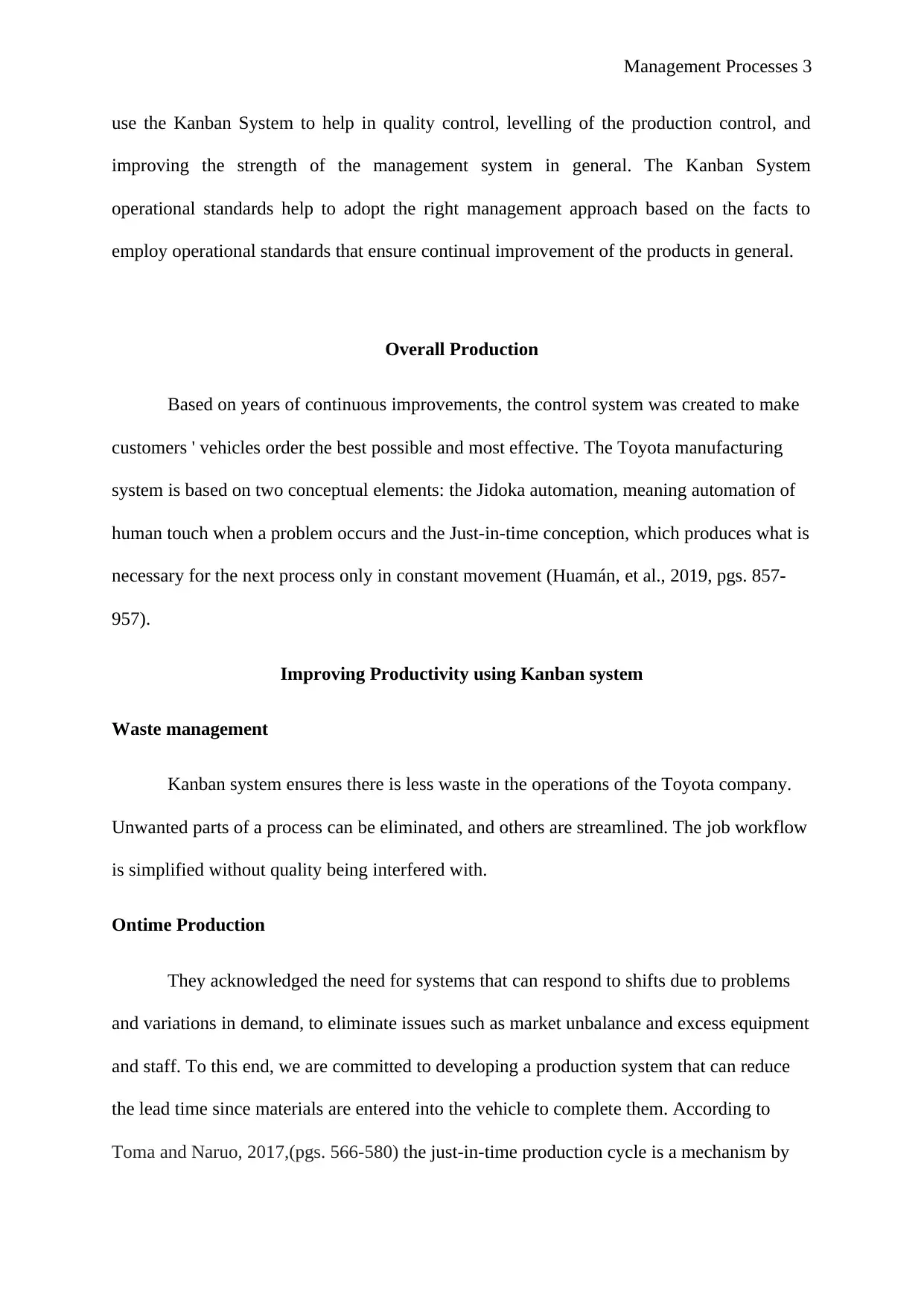
Management Processes 3
use the Kanban System to help in quality control, levelling of the production control, and
improving the strength of the management system in general. The Kanban System
operational standards help to adopt the right management approach based on the facts to
employ operational standards that ensure continual improvement of the products in general.
Overall Production
Based on years of continuous improvements, the control system was created to make
customers ' vehicles order the best possible and most effective. The Toyota manufacturing
system is based on two conceptual elements: the Jidoka automation, meaning automation of
human touch when a problem occurs and the Just-in-time conception, which produces what is
necessary for the next process only in constant movement (Huamán, et al., 2019, pgs. 857-
957).
Improving Productivity using Kanban system
Waste management
Kanban system ensures there is less waste in the operations of the Toyota company.
Unwanted parts of a process can be eliminated, and others are streamlined. The job workflow
is simplified without quality being interfered with.
Ontime Production
They acknowledged the need for systems that can respond to shifts due to problems
and variations in demand, to eliminate issues such as market unbalance and excess equipment
and staff. To this end, we are committed to developing a production system that can reduce
the lead time since materials are entered into the vehicle to complete them. According to
Toma and Naruo, 2017,(pgs. 566-580) the just-in-time production cycle is a mechanism by
use the Kanban System to help in quality control, levelling of the production control, and
improving the strength of the management system in general. The Kanban System
operational standards help to adopt the right management approach based on the facts to
employ operational standards that ensure continual improvement of the products in general.
Overall Production
Based on years of continuous improvements, the control system was created to make
customers ' vehicles order the best possible and most effective. The Toyota manufacturing
system is based on two conceptual elements: the Jidoka automation, meaning automation of
human touch when a problem occurs and the Just-in-time conception, which produces what is
necessary for the next process only in constant movement (Huamán, et al., 2019, pgs. 857-
957).
Improving Productivity using Kanban system
Waste management
Kanban system ensures there is less waste in the operations of the Toyota company.
Unwanted parts of a process can be eliminated, and others are streamlined. The job workflow
is simplified without quality being interfered with.
Ontime Production
They acknowledged the need for systems that can respond to shifts due to problems
and variations in demand, to eliminate issues such as market unbalance and excess equipment
and staff. To this end, we are committed to developing a production system that can reduce
the lead time since materials are entered into the vehicle to complete them. According to
Toma and Naruo, 2017,(pgs. 566-580) the just-in-time production cycle is a mechanism by
⊘ This is a preview!⊘
Do you want full access?
Subscribe today to unlock all pages.

Trusted by 1+ million students worldwide
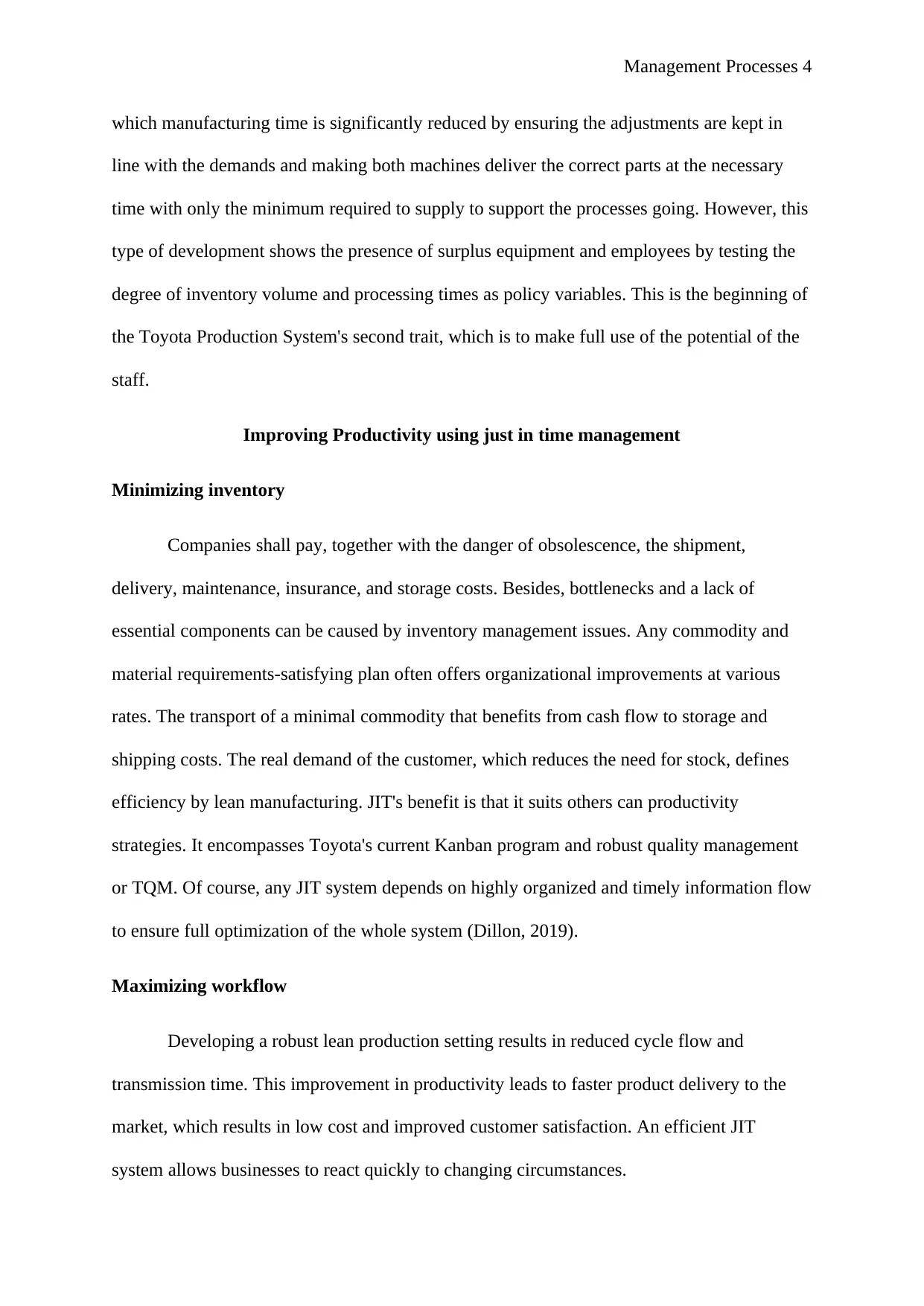
Management Processes 4
which manufacturing time is significantly reduced by ensuring the adjustments are kept in
line with the demands and making both machines deliver the correct parts at the necessary
time with only the minimum required to supply to support the processes going. However, this
type of development shows the presence of surplus equipment and employees by testing the
degree of inventory volume and processing times as policy variables. This is the beginning of
the Toyota Production System's second trait, which is to make full use of the potential of the
staff.
Improving Productivity using just in time management
Minimizing inventory
Companies shall pay, together with the danger of obsolescence, the shipment,
delivery, maintenance, insurance, and storage costs. Besides, bottlenecks and a lack of
essential components can be caused by inventory management issues. Any commodity and
material requirements-satisfying plan often offers organizational improvements at various
rates. The transport of a minimal commodity that benefits from cash flow to storage and
shipping costs. The real demand of the customer, which reduces the need for stock, defines
efficiency by lean manufacturing. JIT's benefit is that it suits others can productivity
strategies. It encompasses Toyota's current Kanban program and robust quality management
or TQM. Of course, any JIT system depends on highly organized and timely information flow
to ensure full optimization of the whole system (Dillon, 2019).
Maximizing workflow
Developing a robust lean production setting results in reduced cycle flow and
transmission time. This improvement in productivity leads to faster product delivery to the
market, which results in low cost and improved customer satisfaction. An efficient JIT
system allows businesses to react quickly to changing circumstances. ⠀
which manufacturing time is significantly reduced by ensuring the adjustments are kept in
line with the demands and making both machines deliver the correct parts at the necessary
time with only the minimum required to supply to support the processes going. However, this
type of development shows the presence of surplus equipment and employees by testing the
degree of inventory volume and processing times as policy variables. This is the beginning of
the Toyota Production System's second trait, which is to make full use of the potential of the
staff.
Improving Productivity using just in time management
Minimizing inventory
Companies shall pay, together with the danger of obsolescence, the shipment,
delivery, maintenance, insurance, and storage costs. Besides, bottlenecks and a lack of
essential components can be caused by inventory management issues. Any commodity and
material requirements-satisfying plan often offers organizational improvements at various
rates. The transport of a minimal commodity that benefits from cash flow to storage and
shipping costs. The real demand of the customer, which reduces the need for stock, defines
efficiency by lean manufacturing. JIT's benefit is that it suits others can productivity
strategies. It encompasses Toyota's current Kanban program and robust quality management
or TQM. Of course, any JIT system depends on highly organized and timely information flow
to ensure full optimization of the whole system (Dillon, 2019).
Maximizing workflow
Developing a robust lean production setting results in reduced cycle flow and
transmission time. This improvement in productivity leads to faster product delivery to the
market, which results in low cost and improved customer satisfaction. An efficient JIT
system allows businesses to react quickly to changing circumstances. ⠀
Paraphrase This Document
Need a fresh take? Get an instant paraphrase of this document with our AI Paraphraser
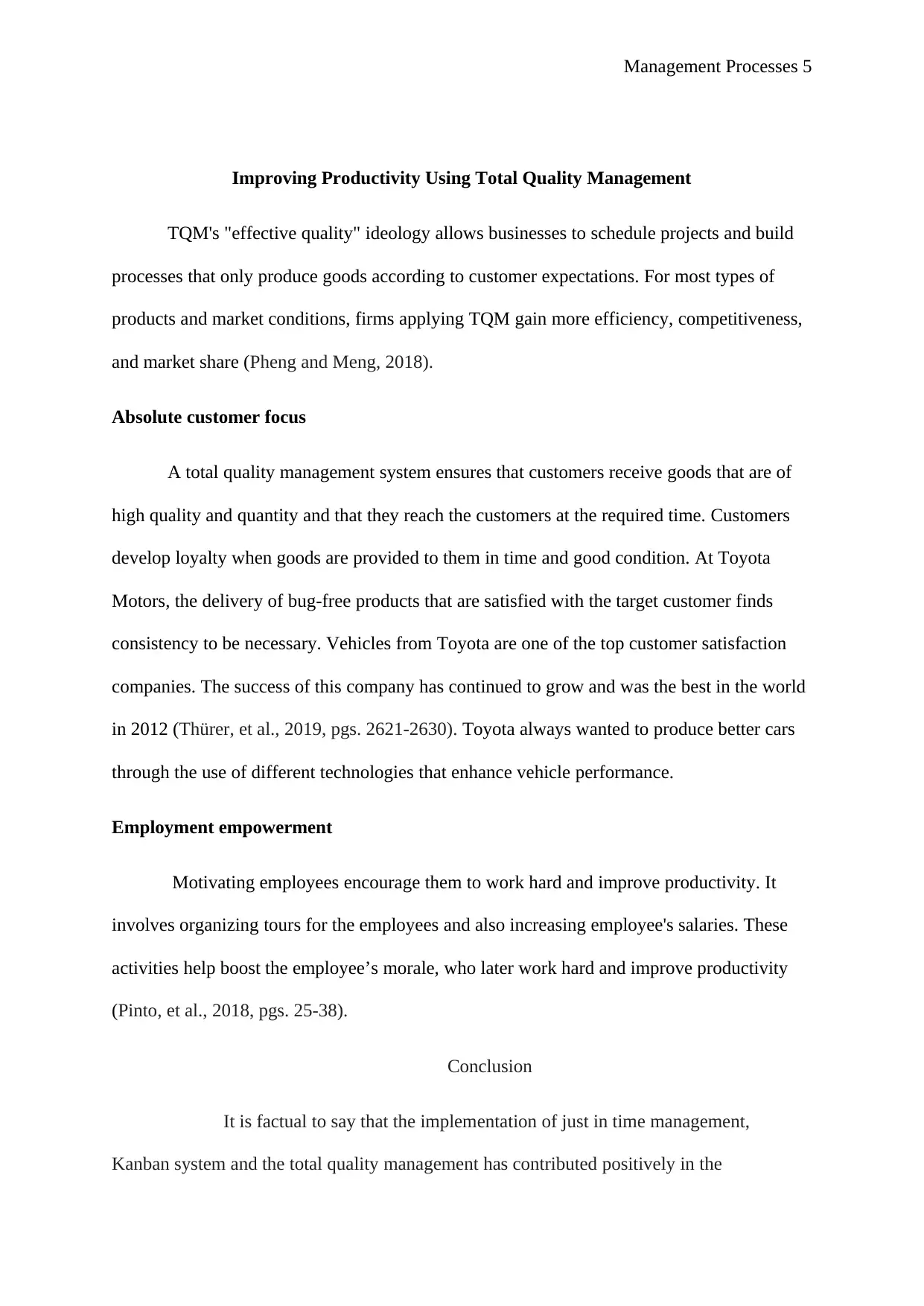
Management Processes 5
Improving Productivity Using Total Quality Management
TQM's "effective quality" ideology allows businesses to schedule projects and build
processes that only produce goods according to customer expectations. For most types of
products and market conditions, firms applying TQM gain more efficiency, competitiveness,
and market share (Pheng and Meng, 2018).
Absolute customer focus
A total quality management system ensures that customers receive goods that are of
high quality and quantity and that they reach the customers at the required time. Customers
develop loyalty when goods are provided to them in time and good condition. At Toyota
Motors, the delivery of bug-free products that are satisfied with the target customer finds
consistency to be necessary. Vehicles from Toyota are one of the top customer satisfaction
companies. The success of this company has continued to grow and was the best in the world
in 2012 (Thürer, et al., 2019, pgs. 2621-2630). Toyota always wanted to produce better cars
through the use of different technologies that enhance vehicle performance.
Employment empowerment
Motivating employees encourage them to work hard and improve productivity. It
involves organizing tours for the employees and also increasing employee's salaries. These
activities help boost the employee’s morale, who later work hard and improve productivity
(Pinto, et al., 2018, pgs. 25-38).
Conclusion
It is factual to say that the implementation of just in time management,
Kanban system and the total quality management has contributed positively in the
Improving Productivity Using Total Quality Management
TQM's "effective quality" ideology allows businesses to schedule projects and build
processes that only produce goods according to customer expectations. For most types of
products and market conditions, firms applying TQM gain more efficiency, competitiveness,
and market share (Pheng and Meng, 2018).
Absolute customer focus
A total quality management system ensures that customers receive goods that are of
high quality and quantity and that they reach the customers at the required time. Customers
develop loyalty when goods are provided to them in time and good condition. At Toyota
Motors, the delivery of bug-free products that are satisfied with the target customer finds
consistency to be necessary. Vehicles from Toyota are one of the top customer satisfaction
companies. The success of this company has continued to grow and was the best in the world
in 2012 (Thürer, et al., 2019, pgs. 2621-2630). Toyota always wanted to produce better cars
through the use of different technologies that enhance vehicle performance.
Employment empowerment
Motivating employees encourage them to work hard and improve productivity. It
involves organizing tours for the employees and also increasing employee's salaries. These
activities help boost the employee’s morale, who later work hard and improve productivity
(Pinto, et al., 2018, pgs. 25-38).
Conclusion
It is factual to say that the implementation of just in time management,
Kanban system and the total quality management has contributed positively in the
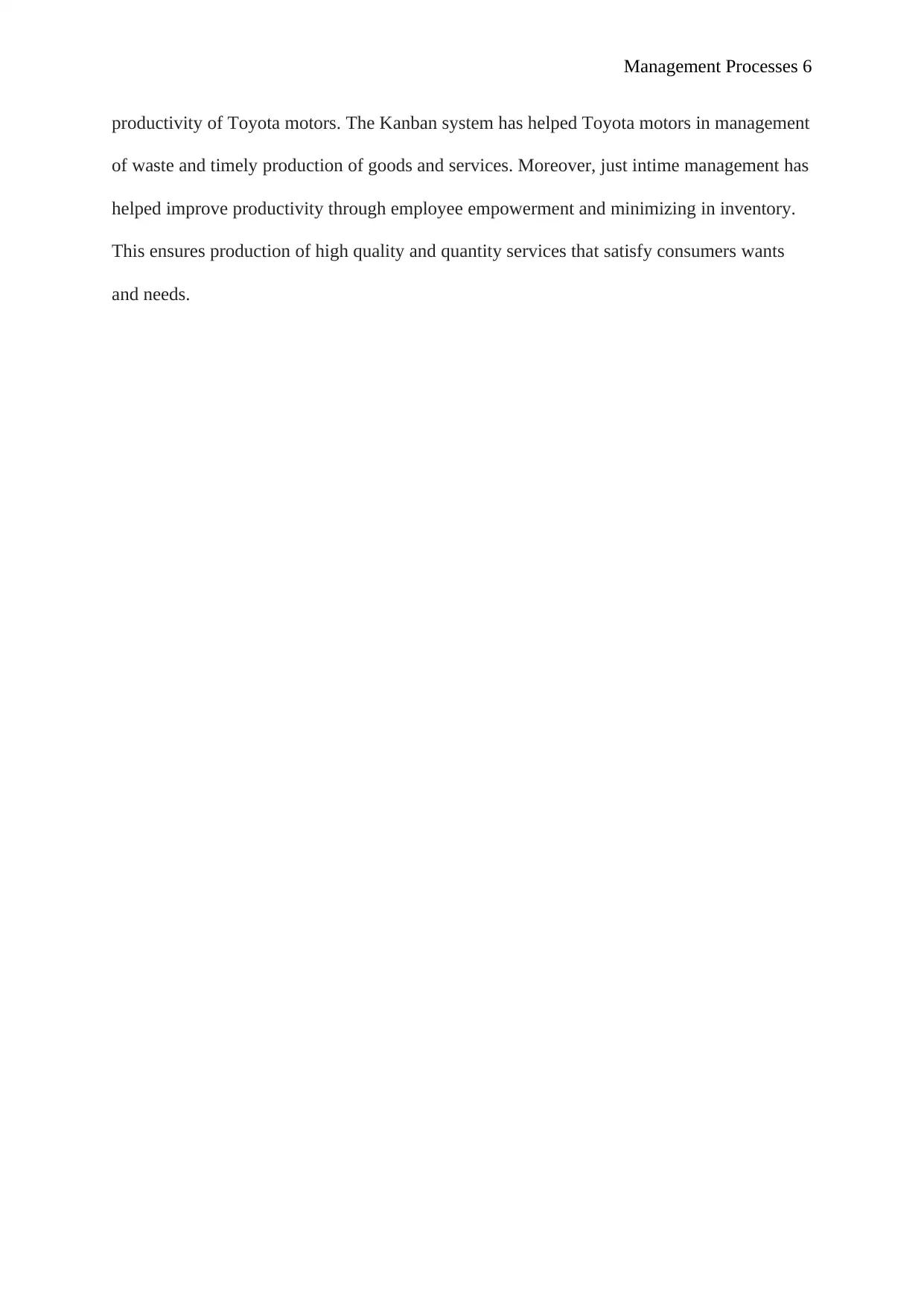
Management Processes 6
productivity of Toyota motors. The Kanban system has helped Toyota motors in management
of waste and timely production of goods and services. Moreover, just intime management has
helped improve productivity through employee empowerment and minimizing in inventory.
This ensures production of high quality and quantity services that satisfy consumers wants
and needs.
productivity of Toyota motors. The Kanban system has helped Toyota motors in management
of waste and timely production of goods and services. Moreover, just intime management has
helped improve productivity through employee empowerment and minimizing in inventory.
This ensures production of high quality and quantity services that satisfy consumers wants
and needs.
⊘ This is a preview!⊘
Do you want full access?
Subscribe today to unlock all pages.

Trusted by 1+ million students worldwide
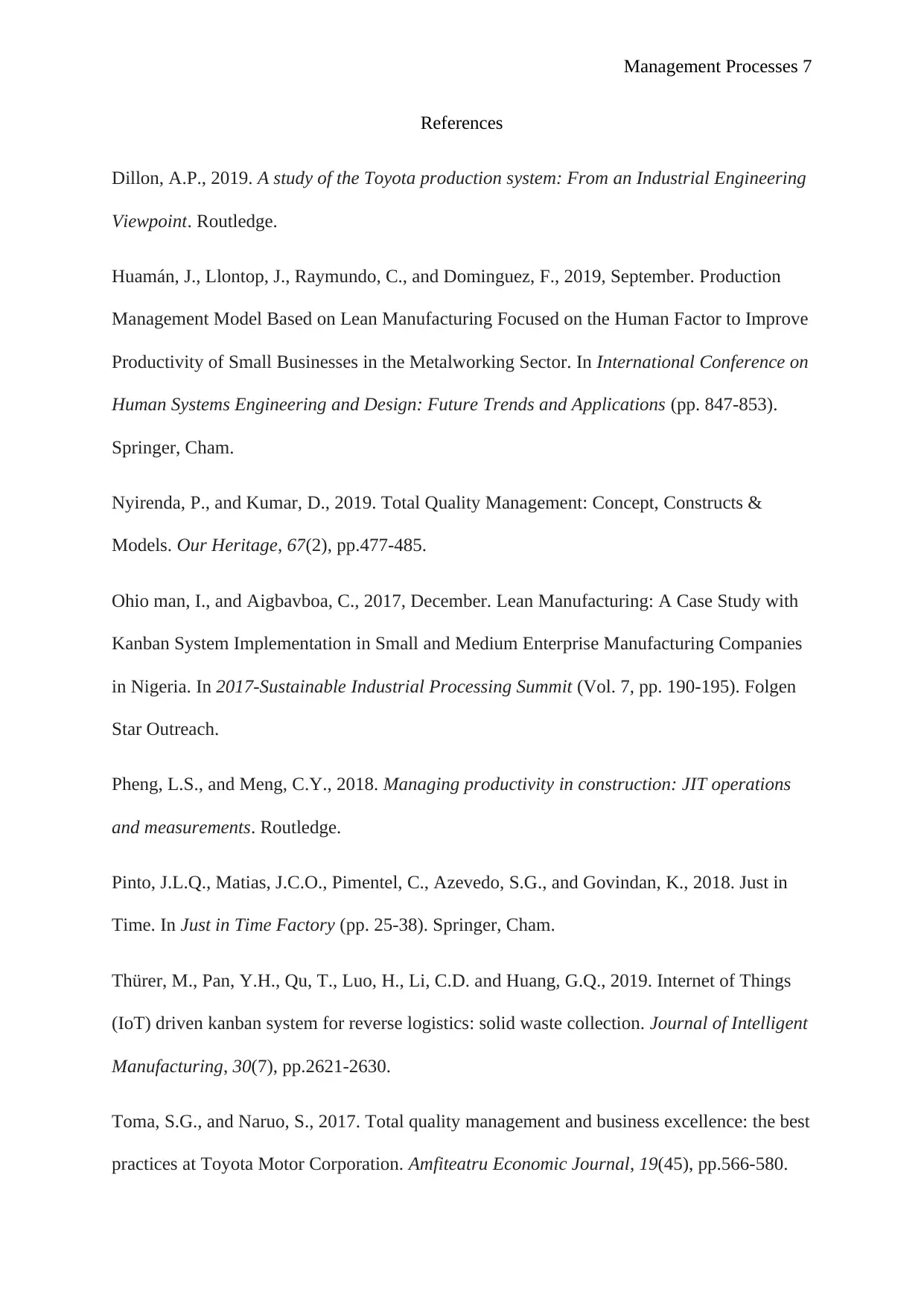
Management Processes 7
References
Dillon, A.P., 2019. A study of the Toyota production system: From an Industrial Engineering
Viewpoint. Routledge.
Huamán, J., Llontop, J., Raymundo, C., and Dominguez, F., 2019, September. Production
Management Model Based on Lean Manufacturing Focused on the Human Factor to Improve
Productivity of Small Businesses in the Metalworking Sector. In International Conference on
Human Systems Engineering and Design: Future Trends and Applications (pp. 847-853).
Springer, Cham.
Nyirenda, P., and Kumar, D., 2019. Total Quality Management: Concept, Constructs &
Models. Our Heritage, 67(2), pp.477-485.
Ohio man, I., and Aigbavboa, C., 2017, December. Lean Manufacturing: A Case Study with
Kanban System Implementation in Small and Medium Enterprise Manufacturing Companies
in Nigeria. In 2017-Sustainable Industrial Processing Summit (Vol. 7, pp. 190-195). Folgen
Star Outreach.
Pheng, L.S., and Meng, C.Y., 2018. Managing productivity in construction: JIT operations
and measurements. Routledge.
Pinto, J.L.Q., Matias, J.C.O., Pimentel, C., Azevedo, S.G., and Govindan, K., 2018. Just in
Time. In Just in Time Factory (pp. 25-38). Springer, Cham.
Thürer, M., Pan, Y.H., Qu, T., Luo, H., Li, C.D. and Huang, G.Q., 2019. Internet of Things
(IoT) driven kanban system for reverse logistics: solid waste collection. Journal of Intelligent
Manufacturing, 30(7), pp.2621-2630.
Toma, S.G., and Naruo, S., 2017. Total quality management and business excellence: the best
practices at Toyota Motor Corporation. Amfiteatru Economic Journal, 19(45), pp.566-580.
References
Dillon, A.P., 2019. A study of the Toyota production system: From an Industrial Engineering
Viewpoint. Routledge.
Huamán, J., Llontop, J., Raymundo, C., and Dominguez, F., 2019, September. Production
Management Model Based on Lean Manufacturing Focused on the Human Factor to Improve
Productivity of Small Businesses in the Metalworking Sector. In International Conference on
Human Systems Engineering and Design: Future Trends and Applications (pp. 847-853).
Springer, Cham.
Nyirenda, P., and Kumar, D., 2019. Total Quality Management: Concept, Constructs &
Models. Our Heritage, 67(2), pp.477-485.
Ohio man, I., and Aigbavboa, C., 2017, December. Lean Manufacturing: A Case Study with
Kanban System Implementation in Small and Medium Enterprise Manufacturing Companies
in Nigeria. In 2017-Sustainable Industrial Processing Summit (Vol. 7, pp. 190-195). Folgen
Star Outreach.
Pheng, L.S., and Meng, C.Y., 2018. Managing productivity in construction: JIT operations
and measurements. Routledge.
Pinto, J.L.Q., Matias, J.C.O., Pimentel, C., Azevedo, S.G., and Govindan, K., 2018. Just in
Time. In Just in Time Factory (pp. 25-38). Springer, Cham.
Thürer, M., Pan, Y.H., Qu, T., Luo, H., Li, C.D. and Huang, G.Q., 2019. Internet of Things
(IoT) driven kanban system for reverse logistics: solid waste collection. Journal of Intelligent
Manufacturing, 30(7), pp.2621-2630.
Toma, S.G., and Naruo, S., 2017. Total quality management and business excellence: the best
practices at Toyota Motor Corporation. Amfiteatru Economic Journal, 19(45), pp.566-580.
1 out of 7
Related Documents
Your All-in-One AI-Powered Toolkit for Academic Success.
+13062052269
info@desklib.com
Available 24*7 on WhatsApp / Email
![[object Object]](/_next/static/media/star-bottom.7253800d.svg)
Unlock your academic potential
Copyright © 2020–2026 A2Z Services. All Rights Reserved. Developed and managed by ZUCOL.





